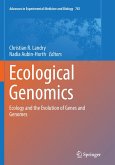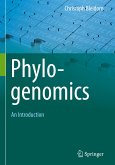Researchers in the field of ecological genomics aim to determine how a genome or a population of genomes interacts with its environment across ecological and evolutionary timescales. Ecological genomics is trans-disciplinary by nature. Ecologists have turned to genomics to be able to elucidate the mechanistic bases of the biodiversity their research tries to understand. Genomicists have turned to ecology in order to better explain the functional cellular and molecular variation they observed in their model organisms.
We provide an advanced-level book that covers this recent research and proposes future development for this field. A synthesis of the field of ecological genomics emerges from this volume. Ecological Genomics covers a wide array of organisms (microbes, plants and animals) in order to be able to identify central concepts that motivate and derive from recent investigations in different branches of the tree of life.
Ecological Genomics covers 3 fields of research that have most benefited from the recent technological and conceptual developments in the field of ecological genomics: the study of life-history evolution and its impact of genome architectures; the study of the genomic bases of phenotypic plasticity and the study of the genomic bases of adaptation and speciation.
We provide an advanced-level book that covers this recent research and proposes future development for this field. A synthesis of the field of ecological genomics emerges from this volume. Ecological Genomics covers a wide array of organisms (microbes, plants and animals) in order to be able to identify central concepts that motivate and derive from recent investigations in different branches of the tree of life.
Ecological Genomics covers 3 fields of research that have most benefited from the recent technological and conceptual developments in the field of ecological genomics: the study of life-history evolution and its impact of genome architectures; the study of the genomic bases of phenotypic plasticity and the study of the genomic bases of adaptation and speciation.








